 W
WACARM-ng is an open source IDS/IPS system. ACARM-ng is an alert correlation software which can significantly facilitate analyses of traffic in computer networks. It is responsible for collection and correlation of alerts sent by network and host sensors, also referred to as NIDS and HIDS respectively. Correlation process aims to reduce the total number of messages that need to be viewed by a system administrator to as few as possible by merging similar events into groups representing logical pieces of malicious activity.
 W
WAircrack-ng is a network software suite consisting of a detector, packet sniffer, WEP and WPA/WPA2-PSK cracker and analysis tool for 802.11 wireless LANs. It works with any wireless network interface controller whose driver supports raw monitoring mode and can sniff 802.11a, 802.11b and 802.11g traffic. The program runs under Linux, FreeBSD, macOS, OpenBSD, and Windows; the Linux version is packaged for OpenWrt and has also been ported to the Android, Zaurus PDA and Maemo platforms; and a proof of concept port has been made to the iPhone.
 W
WTails, or The Amnesic Incognito Live System, is a security-focused Debian-based Linux distribution aimed at preserving privacy and anonymity. All its incoming and outgoing connections are forced to go through Tor, and any non-anonymous connections are blocked. The system is designed to be booted as a live DVD or live USB, and will leave no digital footprint on the machine unless explicitly told to do so. The Tor Project provided financial support for its development in the beginnings of the project. Tails comes with UEFI Secure Boot.
 W
WApache Shiro is an open source software security framework that performs authentication, authorization, cryptography and session management. Shiro has been designed to be an intuitive and easy-to-use framework while still providing robust security features.
 W
WArmitage is a graphical cyber attack management tool for the Metasploit Project that visualizes targets and recommends exploits. It is a free and open source network security tool notable for its contributions to red team collaboration allowing for: shared sessions, data, and communication through a single Metasploit instance. Armitage is written and supported by Raphael Mudge.
 W
WArpON is a computer software project to improve network security. It has attracted interest among network managers and academic researchers and is frequently cited as a means of protecting against ARP-based attacks.
 W
WClam AntiVirus (ClamAV) is a free software, cross-platform and open-source antivirus software toolkit able to detect many types of malicious software, including viruses. One of its main uses is on mail servers as a server-side email virus scanner. The application was developed for Unix and has third party versions available for AIX, BSD, HP-UX, Linux, macOS, OpenVMS, OSF (Tru64) and Solaris. As of version 0.97.5, ClamAV builds and runs on Microsoft Windows. Both ClamAV and its updates are made available free of charge.
 W
WClamTk is a free software graphical interface for the ClamAV command line antivirus software program, for Linux desktop users. It provides both on-demand and scheduled scanning. The project was started by Dave Mauroni in February 2004 and remains under development.
 W
WClamWin Free Antivirus is a free and open-source antivirus tool for Windows. It provides a graphical user interface to the Clam AntiVirus engine.
 W
WCryptocat is a discontinued open-source desktop application intended to allow encrypted online chatting available for Windows, OS X, and Linux. It uses end-to-end encryption to secure all communications to other Cryptocat users. Users are given the option of independently verifying their buddies' device lists and are notified when a buddy's device list is modified and all updates are verified through the built-in update downloader.
 W
WDecentraleyes is a free and open-source browser extension used for local content delivery network (CDN) emulation. Its primary task is to block connections to major CDNs such as Cloudflare and Google, and serve popular web libraries locally on the users machine. Decentraleyes is available for the Microsoft Edge, Mozilla Firefox + Firefox ESR, Google Chrome, Pale Moon and Opera web browsers.
 W
WDiskCryptor is a free and open-source full disk encryption system for Microsoft Windows. It allows for the encryption of a PC's entire hard drive or individual partitions – including the ability to encrypt the partition and disk on which the OS is installed.
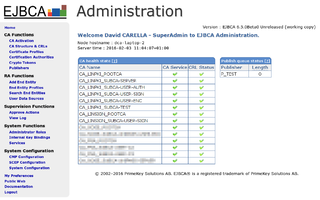 W
WEJBCA is a free software public key infrastructure (PKI) certificate authority software package maintained and sponsored by the Swedish for-profit company PrimeKey Solutions AB, which holds the copyright to most of the codebase. The project's source code is available under the terms of the Lesser GNU General Public License (LGPL). The EJBCA software package is used to install a privately operated certificate authority. This is in contrast to commercial certificate authorities that are operated by a trusted third party. Since its inception EJBCA has been used as certificate authority software for different use cases, including eGovernment, endpoint management, research, energy, eIDAS, telecom, networking, and for usage in SMEs.
 W
WFail2Ban is an intrusion prevention software framework that protects computer servers from brute-force attacks. Written in the Python programming language, it is able to run on POSIX systems that have an interface to a packet-control system or firewall installed locally, for example, iptables or TCP Wrapper.
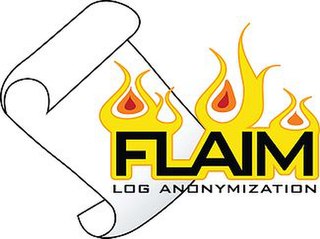 W
WFLAIM is a modular tool designed to allow computer and network log sharing through application of complex data sanitization policies.
 W
WFreeLAN is computer software that implements peer-to-peer, full mesh, virtual private network (VPN) techniques for creating secure point-to-point or site-to-site connections in routed or bridged configurations and remote access facilities. It is free and open-source software licensed under the GNU General Public License Version 3.
 W
WFreeOTFE is a discontinued open source computer program for on-the-fly disk encryption (OTFE). On Microsoft Windows, and Windows Mobile, it can create a virtual drive within a file or partition, to which anything written is automatically encrypted before being stored on a computer's hard or USB drive. It is similar in function to other disk encryption programs including TrueCrypt and Microsoft's BitLocker.
 W
WGNU Privacy Guard is a free-software replacement for Symantec's PGP cryptographic software suite. It is compliant with RFC 4880, the IETF standards-track specification of OpenPGP. Modern versions of PGP are interoperable with GnuPG and other OpenPGP-compliant systems.
 W
WGnuTLS is a free software implementation of the TLS, SSL and DTLS protocols. It offers an application programming interface (API) for applications to enable secure communication over the network transport layer, as well as interfaces to access X.509, PKCS #12, OpenPGP and other structures.
 W
WHijackThis is a free and open-source tool to detect malware and adware on Microsoft Windows. It was originally created by Merijn Bellekom, and later sold to Trend Micro. The program is notable for quickly scanning a user's computer to display the most common locations of malware, rather than relying on a database of known spyware. HijackThis is used primarily for diagnosis of malware, not to remove or detect spyware—as uninformed use of its removal facilities can cause significant software damage to a computer. Browser hijacking can cause malware to be installed on a computer.
 W
WiGap is a free Iranian instant messaging application for smart phones and personal computers. iGap allows users to interact with each other and exchange information through text, image, video, audio and other types of messages. iGap also supports P2P-based voice calls over the internet.
 W
WJava Anon Proxy (JAP) also known as JonDonym, is a proxy system designed to allow browsing the Web with revocable pseudonymity. It was originally developed as part of a project of the Technische Universität Dresden, the Universität Regensburg and Privacy Commissioner of the state of Schleswig-Holstein. The client-software is written in the Java programming language.
 W
WJohn the Ripper is a free password cracking software tool. Originally developed for the Unix operating system, it can run on fifteen different platforms. It is among the most frequently used password testing and breaking programs as it combines a number of password crackers into one package, autodetects password hash types, and includes a customizable cracker. It can be run against various encrypted password formats including several crypt password hash types most commonly found on various Unix versions, Kerberos AFS, and Windows NT/2000/XP/2003 LM hash. Additional modules have extended its ability to include MD4-based password hashes and passwords stored in LDAP, MySQL, and others.
 W
WKali NetHunter is a free and open-source mobile penetration testing platform for Android devices, based on Kali Linux. Kali NetHunter is available for un-rooted devices, for rooted devices that have a custom recovery, and for rooted devices with custom recovery for which a NetHunter specific kernel is available (NetHunter). Official images are published by Offensive Security on their download page and are updated every quarter. NetHunter images with custom kernels are published for the most popular supported devices, such as Google Nexus, Samsung Galaxy and OnePlus. Many more models are supported, and images not published by Offensive Security can be generated using NetHunter build scripts. Kali NetHunter is maintained by a community of volunteers, and is funded by Offensive Security.
 W
WLibreSSL is an open-source implementation of the Transport Layer Security (TLS) protocol. The implementation is named after Secure Sockets Layer (SSL), the deprecated predecessor of TLS, for which support was removed in release 2.3.0. The OpenBSD project forked LibreSSL from OpenSSL 1.0.1g in April 2014 as a response to the Heartbleed security vulnerability, with the goals of modernizing the codebase, improving security, and applying development best practices.
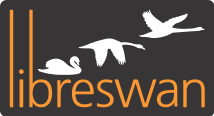 W
WLibreswan is a fork of the Openswan IPsec VPN implementation.
 W
WLinux Malware Detect, abbreviated as LMD or maldet, is a software package that looks for malware on Linux systems and reports on it.
 W
WMISP Threat Sharing (MISP) is an open source threat intelligence platform. The project develops utilities and documentation for more effective threat intelligence, by sharing indicators of compromise. There are several organizations who run MISP instances, who are listed on the website.
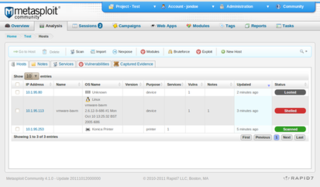 W
WThe Metasploit Project is a computer security project that provides information about security vulnerabilities and aids in penetration testing and IDS signature development. It is owned by Boston, Massachusetts-based security company Rapid7.
 W
WMyDLP is a data loss prevention solution originally available released as free and open source software. Supported data inspection channels include web, mail, instant messaging, file transfer to removable storage devices and printers. The MyDLP development project originally made its source code available under the terms of the GNU General Public License.
 W
WNikto is a free software command-line vulnerability scanner that scans webservers for dangerous files/CGIs, outdated server software and other problems. It performs generic and server type specific checks. It also captures and prints any cookies received. The Nikto code itself is free software, but the data files it uses to drive the program are not. Version 1.00 was released December 27, 2001.
 W
WNuFW is a software package that extends Netfilter, the Linux kernel-internal packet filtering firewall module. NuFW adds authentication to filtering rules. NuFW is also provided as a hardware firewall, in the EdenWall firewalling appliance. NuFW has been restarted by the FFI and renamed into UFWI.
 W
WOMEMO is an extension to the Extensible Messaging and Presence Protocol (XMPP) for multi-client end-to-end encryption developed by Andreas Straub. According to Straub, OMEMO uses the Double Ratchet Algorithm "to provide multi-end to multi-end encryption, allowing messages to be synchronized securely across multiple clients, even if some of them are offline". The name "OMEMO" is a recursive acronym for "OMEMO Multi-End Message and Object Encryption". It is an open standard based on the Double Ratchet Algorithm and the Personal Eventing Protocol . OMEMO offers future and forward secrecy and deniability with message synchronization and offline delivery.
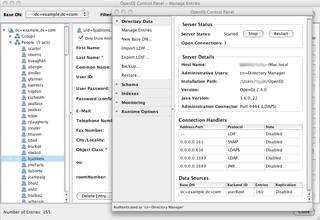 W
WOpenDJ is a directory server which implements a wide range of Lightweight Directory Access Protocol and related standards, including full compliance with LDAPv3 but also support for Directory Service Markup Language (DSMLv2). Written in Java, OpenDJ offers multi-master replication, access control, and many extensions.
 W
WOpenPuff Steganography and Watermarking, sometimes abbreviated OpenPuff or Puff, is a free steganography tool for Microsoft Windows created by Cosimo Oliboni and still maintained as independent software. The program is notable for being the first steganography tool that:lets users hide data in more than a single carrier file. When hidden data are split among a set of carrier files you get a carrier chain, with no enforced hidden data theoretical size limit implements 3 layers of hidden data obfuscation extends deniable cryptography into deniable steganography
 W
WOpenSSH is a suite of secure networking utilities based on the Secure Shell (SSH) protocol, which provides a secure channel over an unsecured network in a client–server architecture.
 W
WOpenSSL is a software library for applications that secure communications over computer networks against eavesdropping or need to identify the party at the other end. It is widely used by Internet servers, including the majority of HTTPS websites.
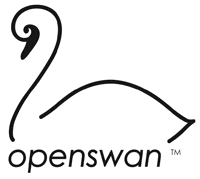 W
WIn the field of computer security, Openswan provides a complete IPsec implementation for Linux 2.0, 2.2, 2.4 and 2.6 kernels.
 W
WOphcrack is a free open-source program that cracks Windows log-in passwords by using LM hashes through rainbow tables. The program includes the ability to import the hashes from a variety of formats, including dumping directly from the SAM files of Windows. On most computers, ophcrack can crack most passwords within a few minutes.
 W
WPrey is a software and online platform for mobile device tracking, management, and protection available for laptops, tablets, and mobiles. The software and service is developed by the Chilean company Prey Inc., successor of the funding company Fork Ltd.
 W
WProtonMail is an end-to-end encrypted email service founded in 2013 in Geneva, Switzerland by scientists who spent time at the CERN research facility. ProtonMail uses client-side encryption to protect email content and user data before they are sent to ProtonMail servers, unlike other common email providers such as Gmail and Outlook.com. The service can be accessed through a webmail client, the Tor network, or dedicated iOS and Android apps.
 W
WRicochet or Ricochet IM is a free software, multi-platform, instant messaging software project originally developed by John Brooks and later adopted as the official instant messaging client project of the Invisible.im group. A goal of the Invisible.im group is to help people maintain privacy by developing a "metadata free" instant messaging client.
 W
Ws2n is an open-source C99 implementation of the Transport Layer Security (TLS) protocol developed by Amazon Web Services (AWS) and released in 2015. It was developed to ensure the code—about 6,000 lines long—would be easier to review than that of OpenSSL—with 500,000 lines, 70,000 of which are involved in processing TLS.
 W
WSignal is a cross-platform centralized encrypted instant messaging service developed by the Signal Technology Foundation and Signal Messenger LLC. Users can send one-to-one and group messages, which can include files, voice notes, images and videos. It can also be used to make one-to-one and group voice and video calls, and the Android version can optionally function as an SMS app.
 W
WThe Sleuth Kit (TSK) is a library and collection of Unix- and Windows-based utilities for extracting data from disk drives and other storage so as to facilitate the forensic analysis of computer systems. It forms the foundation for Autopsy, a better known tool that is essentially a graphical user interface to the command line utilities bundled with The Sleuth Kit.
 W
WSnort is a free open source network intrusion detection system (IDS) and intrusion prevention system (IPS) created in 1998 by Martin Roesch, founder and former CTO of Sourcefire. Snort is now developed by Cisco, which purchased Sourcefire in 2013.
 W
WSSL-Explorer: Community Edition was an open-source SSL VPN product developed by 3SP Ltd, a company acquired by Barracuda Networks. It is licensed under the GNU General Public License (GPL), and is aimed primarily at smaller businesses that need remote access to internal network resources.
 W
WSuricata is an open source-based intrusion detection system (IDS) and intrusion prevention system (IPS). It was developed by the Open Information Security Foundation (OISF). A beta version was released in December 2009, with the first standard release following in July 2010.
 W
WSystemRescue is a Linux distribution for x86 64 and x86 computers. The primary purpose of SystemRescue is to repair unbootable or otherwise damaged computer systems after a system crash. SystemRescue is not intended to be used as a permanent operating system. It runs from a Live CD, a USB flash drive or any type of hard drive. It was designed by a team led by François Dupoux, and is based on Arch Linux. Starting with version 6.0, it has systemd as its init system.
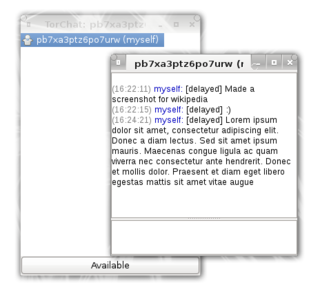 W
WTorChat was a centralized client-server quasi-anonymous instant messenger based on Instantbird, that used Tor onion services as its underlying network. It provides cryptographically secure text messaging and file transfers. The characteristics of Tor's onion services ensure that all traffic between the clients is encrypted and that it is very difficult to tell who is communicating with whom and where a given client is physically located, but suffers from metadata leaks.
 W
WTutanota is an end-to-end encrypted email software and freemium hosted secure email service. Its motto is "einfach.sicher.mailen" in German, meaning "easy.secure.mailing".
 W
WuBlock Origin ( "you-block") is a free and open-source, cross-platform browser extension for content-filtering, including ad-blocking. The extension is available for several browsers: Chrome, Chromium, Edge, Firefox, Opera, Pale Moon, as well as versions of Safari prior to 13. uBlock Origin has received praise from technology websites and is reported to be much less memory-intensive than other extensions with similar functionality. uBlock Origin's stated purpose is to give users the means to enforce their own (content-filtering) choices.
 W
WVTun is a networking application which can set up Virtual Tunnels over TCP/IP networks. It supports Internet Protocol (IP), Point-to-Point Protocol (PPP) and Serial Line Internet Protocol (SLIP) protocols. It exists as the reference implementation of the Tun/Tap user-space tunnel driver which was included in the Linux kernel as of version 2.4, also originally developed by Maxim Krasnyansky. Bishop Clark is the current maintainer.
 W
WVyOS is an open source network operating system based on Debian.
 W
Ww3af is an open-source web application security scanner. The project provides a vulnerability scanner and exploitation tool for Web applications. It provides information about security vulnerabilities for use in penetration testing engagements. The scanner offers a graphical user interface and a command-line interface.
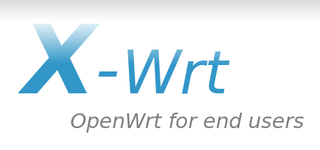 W
WX-Wrt is a set of packages and patches to provide a web interface for the Linux distribution OpenWrt. It is based on haserl and has nothing to do with the X Window System. It allows web based management of an OpenWrt device. It was originally created as a package for OpenWrt White Russian. At present it can be found in the OpenWrt trunk as the webif package. Some newer features such as dual-band support may not be present. On 31 October 2013, the X-Wrt homepage moved to Google Code.